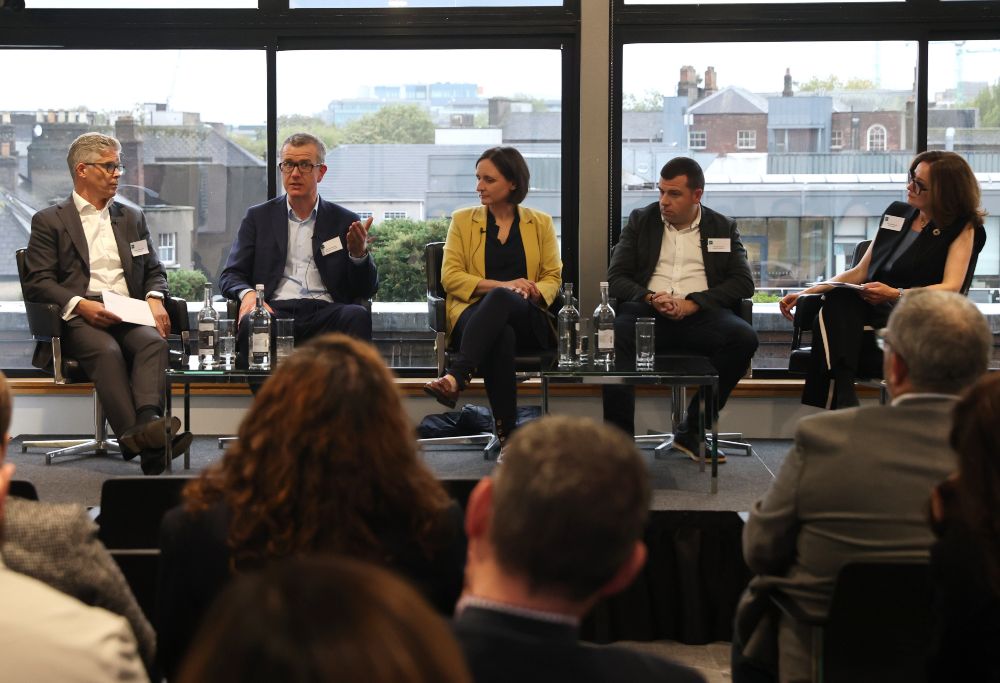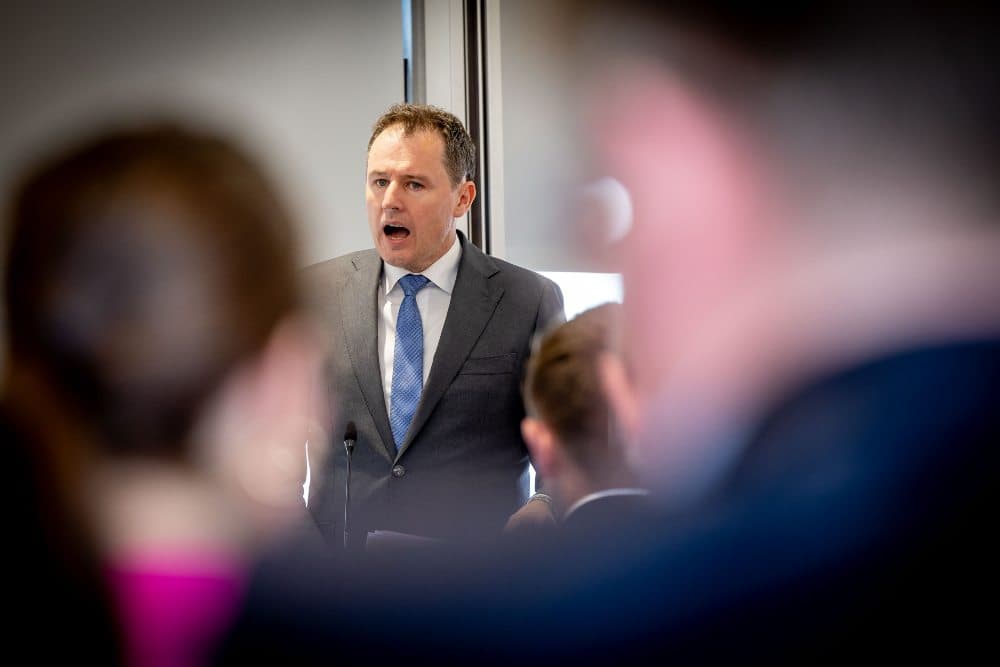The challenges and opportunities of implementing the EU’s new CSRD regulations were revealed at a recent Davy Horizons event by prominent Irish firms.
Never mind inflation. What is clear about the increasing regulations around sustainability for businesses is that one way or another we will all be paying an additional carbon tax of some sort for goods or services in the years ahead as firms race to comply with a growing mountain of green and sustainability regulations.
That was one of the many sobering thoughts left on the table at the recent Davy Horizons ESG Peer Network in Dublin focused on Sustainable Business & Finance – Updates on Policy & Practice.
“Get the double materiality right, know what you have to report on and then try and work back from there”
The event was attended by leaders from some of Ireland’s largest businesses who wished to gain a deeper understanding of sustainability trends and business practices.
It’s no longer just about the money
“In essence, there are a lot of challenges getting ready for CSRD but do it in such a way that it really supports your business and your strategy”
The onset of the Corporate Sustainability Reporting Directive (CSRD) is just one – albeit probably the most important one – of a raft of regulations that businesses have to embrace. There’s the Carbon Border Adjustment Mechanism (CBAM), there’s the Corporate Sustainability Due Diligence Directive (CSDDD) or the EU Sustainable Finance Action Plan, and the EU Green Deal that houses most of these mechanisms. And don’t get us started on the acronym soup coming from the UN, but you’d be familiar with the SDGs (Sustainable Development Goals).
While SMEs may consider these the preserve of larger corporate firms, the truth is that one way or another, especially with CSRD, they will have to report in the right detail if they wish to remain a part of the supply chains of their biggest customers.
What intrigued many at the Davy event was the revelation by Thomas Fowler, Ryanair’s director of Sustainability & Finance, that savvy institutional investors are already interrogating firms’ sustainability disclosures with forensic obsession. This will only accelerate as CSRD sweeps up those who fall into scope.
Diarmuid Murphy, senior policy officer with the European Commission, set the stage by highlighting the European Union’s goals that include a 55% greenhouse gas reduction by 2050 compared with 1990 levels and a 90% reduction by 2040.
“We’ve put in place three pillars of a framework in order to steer investments and incentivise investments into the green transition. The first is the EU Taxonomy in terms of our classification system and we have a Disclosures Dedicated Act which is in play as part of that. The second pair is the CSRD at a company level and the SFDR (Sustainable Finance Disclosures Regulations) with an assessment under way as to how they are being implemented. And thirdly we have the supporting tools in terms of the EU Green Bond Principles (GBP). So we’ve achieved quite a lot since 2018 when the European Commission launched the Sustainable Finance Action Plan.”
With many publicly listed companies (PLCs) required to report to the CSRD from next year, in a panel ably managed by Davy Horizons’ director of ESG Jonathan McKeown, two of Ireland’s biggest businesses Ryanair and Grafton Group plc addressed how firms in the earliest scope of CSRD are getting to grips with it.
Ryanair’s Thomas Fowler “Obviously the double materiality behind it is vitally important and if you get that wrong then you’re back to square one. So the methodology for auditors is very important and being able to stand over it. We’ve only started the process with our auditors now.”]
Double materiality refers to not only financial materiality but also materiality around an organisation’s impact on stakeholders and society.
“Get the double materiality right, know what you have to report on and then try and work back from there,” he advised.
Rosie Howells, Grafton Group PLC’s group head of Sustainability, said that that the construction materials business falls into scope in 2026.
She said that one of the big areas that has focused its attention has been policies around risk but also assurance.
“The one thing that scares people more than anything is how to get through that assurance process. We’re all relatively comfortable in preparing our thoughts and disclosures around accounting practices, but I think the assurance part is so much more different to what we are used to.
“The other thing about double materiality. What I find very interesting is the insights you get from your stakeholders that can help to inform your strategy and you can use it to brief your teams earlier in the process.
Essentially, she explained, firms that used to report solely numbers to their shareholders and the public now need to be able to explain their impact on society and explain how they quantify that impact on an ongoing basis.
“So I think the big shift probably with CSRD is the huge amount of metrics involved for double materiality that previously involved the finance teams but now also you know the HR team has got to lead. And so suddenly you are project managing this piece of the report. So the key is to try and get everybody briefed as early as you can.”
Fowler said that it will take a few years for the CSRD’s double materiality requirements to become a common standard among big businesses. Howells agreed and said that in the short term there is going to be quite a lot of inconsistency between what people are disclosing and why and how they’re disclosing it.
Dr Dorothy Maxell, head of Sustainability & ESG Advisory at Davy Horizons emphasised the importance of supplier engagement and carbon pricing.
Davy Horizons, she said, has been working with the first group of Irish-based PLCs that are coming into scope in the next two years. “For any business it would be very hard to argue that climate change is not material for reporting. It affects the majority of businesses.”
CSRD, she said, requires companies in Scope 1, 2 and 3, to set their near-term reduction targets, their targets for the next eight-to-ten years in terms of what they intend to do to reduce their emissions and help keep the world within a 1.5 degrees Celsius future.
Maxwell said that from her interaction with shareholders and investors, they are looking for third-party approved standards such as science-based standards. “And at the moment science-based targets are the only initiative in town and aligning with that is seen as best practice.”
She said investors will want to see the investment associated with achieving those standards, how it affects your business’s processes, how it informed the double-materiality assessments and the impacts, risks and opportunities.
“In essence, there are a lot of challenges getting ready for CSRD but do it in such a way that it really supports your business and your strategy. The climate transition plan is essential. It’s just a really good, useful, practical plan across your business.”
-
Bank of Ireland is welcoming new customers every day – funding investments, working capital and expansions across multiple sectors. To learn more, click here
-
Listen to the ThinkBusiness Podcast for business insights and inspiration. All episodes are here. You can also listen to the Podcast on:
-
Spotify
-
SoundCloud
-
Apple






